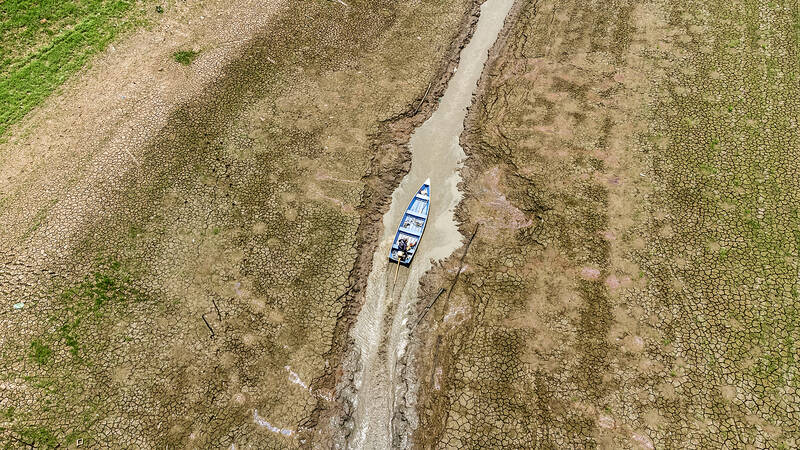An extreme drought in parts of the Amazon has led to a dramatic drop in river water levels, exposing dozens of usually submerged rock formations with carvings of human forms that might date back 2,000 years.
Livia Ribeiro, a longtime resident of the Amazon’s largest city, Manaus, said that she heard about the rock engravings from friends and wanted to check them out.
“I thought it was a lie ... I had never seen this. I’ve lived in Manaus for 27 years,” said Ribeiro, an administrator, after viewing the dazzling relics.

Photo: EPA-EFE
The rock carvings are not usually visible because they are covered by the waters of the Rio Negro, whose flow recorded its lowest level in 121 years last week.
The surfacing of the engravings on the riverbank have delighted scientists and the public alike, but also raised unsettling questions.
“We come, we look at [the engravings] and we think they are beautiful, but at the same time, it is worrying... I also think about whether this river will exist in 50 or 100 years,” Ribeiro said.
Drought in Brazil’s Amazon has drastically reduced river levels in the past few weeks, affecting a region that depends on a maze of waterways for transportation and supplies.
The Brazilian government has sent emergency aid to the area, where normally bustling riverbanks are dry, littered with stranded boats.
The dry season has worsened this year due to El Nino, an irregular climate pattern over the Pacific Ocean that disrupts normal weather, adding to the effect of climate change, experts say.
The engravings comprise an archaeological site of “great relevance,” said Jaime Oliveira, an archeologist at the Brazilian Institute of Historical Heritage (IPHAN).
They are at a site known as Praia das Lajes and were first seen in 2010, during another period of drought not as severe as the current one.
The rock carvings appear against a backdrop of dense jungle, with the low brownish waters of the Negro River flowing nearby.
Most of the engravings are of human faces, some of them rectangular and others oval, with smiles or grim expressions.
“The site expresses emotions, feelings, it is an engraved rock record, but it has something in common with current works of art,” Oliveira said.
For Beatriz Carneiro, historian and member of IPHAN, Praia das Lajes has an “inestimable” value in understanding the first people who inhabited the region, a field still little explored.
“Unhappily it is now reappearing with the worsening of the drought,” Carneiro said. “Having our rivers back [flooded] and keeping the engravings submerged will help preserve them, even more than our work.”

Kehinde Sanni spends his days smoothing out dents and repainting scratched bumpers in a modest autobody shop in Lagos. He has never left Nigeria, yet he speaks glowingly of Burkina Faso military leader Ibrahim Traore. “Nigeria needs someone like Ibrahim Traore of Burkina Faso. He is doing well for his country,” Sanni said. His admiration is shaped by a steady stream of viral videos, memes and social media posts — many misleading or outright false — portraying Traore as a fearless reformer who defied Western powers and reclaimed his country’s dignity. The Burkinabe strongman swept into power following a coup in September 2022

‘FRAGMENTING’: British politics have for a long time been dominated by the Labor Party and the Tories, but polls suggest that Reform now poses a significant challenge Hard-right upstarts Reform UK snatched a parliamentary seat from British Prime Minister Keir Starmer’s Labor Party yesterday in local elections that dealt a blow to the UK’s two establishment parties. Reform, led by anti-immigrant firebrand Nigel Farage, won the by-election in Runcorn and Helsby in northwest England by just six votes, as it picked up gains in other localities, including one mayoralty. The group’s strong showing continues momentum it built up at last year’s general election and appears to confirm a trend that the UK is entering an era of multi-party politics. “For the movement, for the party it’s a very, very big

ENTERTAINMENT: Rio officials have a history of organizing massive concerts on Copacabana Beach, with Madonna’s show drawing about 1.6 million fans last year Lady Gaga on Saturday night gave a free concert in front of 2 million fans who poured onto Copacabana Beach in Rio de Janeiro for the biggest show of her career. “Tonight, we’re making history... Thank you for making history with me,” Lady Gaga told a screaming crowd. The Mother Monster, as she is known, started the show at about 10:10pm local time with her 2011 song Bloody Mary. Cries of joy rose from the tightly packed fans who sang and danced shoulder-to-shoulder on the vast stretch of sand. Concert organizers said 2.1 million people attended the show. Lady Gaga

SUPPORT: The Australian prime minister promised to back Kyiv against Russia’s invasion, saying: ‘That’s my government’s position. It was yesterday. It still is’ Left-leaning Australian Prime Minister Anthony Albanese yesterday basked in his landslide election win, promising a “disciplined, orderly” government to confront cost-of-living pain and tariff turmoil. People clapped as the 62-year-old and his fiancee, Jodie Haydon, who visited his old inner Sydney haunt, Cafe Italia, surrounded by a crowd of jostling photographers and journalists. Albanese’s Labor Party is on course to win at least 83 seats in the 150-member parliament, partial results showed. Opposition leader Peter Dutton’s conservative Liberal-National coalition had just 38 seats, and other parties 12. Another 17 seats were still in doubt. “We will be a disciplined, orderly